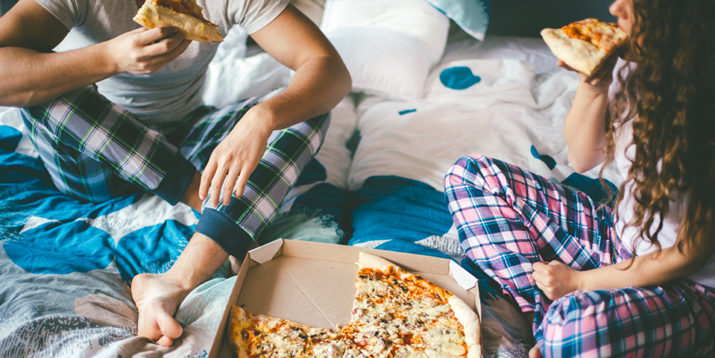5 Eating Habits That Might Be Screwing Up Your Sleep

Raise your hand if you’ve woken up, groggy from a night of tossing, turning, and staring at the ceiling for no good reason.
(~entire country raises a hand~)
Believe it or not, the culprit could be something you ate before bed.
“I’d suggest people avoid eating right before bed,” says Kit Broihier, M.S., R.D., of NutriComm Inc. in Maine. “Our bodies are working on repairing things and rejuvenating during sleep. It’s harder for the body to do that if it’s digesting food at the same time.”
More specifically, a heavy, big meal eaten too close to bedtime can disrupt sleep cycles.
However, taking in a little protein before bed promotes muscle and tissue repairing.
The minimal digesting effort is worth the benefits to muscles, says Denis Faye, M.S.
Let’s take a look at some of the ways your nighttime eating habits might be derailing your best sleep intentions.
5 Eating Habits That Can Mess With Your Sleep
1. You eat way too much before bed
If you don’t go to bed for four or more hours after you eat dinner, a small snack — like plain yogurt and fruit — an hour before bed is fine, says Broihier.
However, “large meals before bed frequently keep people up because reclining after eating a big meal can cause heartburn or gastroesophageal reflux (or GERD),” she adds.
Solution: Be mindful of what you eat and when. Meal planning can prevent days when you come home and end up eating the contents of your fridge because you didn’t plan ahead for dinner.
2 You eat fatty foods before bed
Foods high in fat can slow digestion and lead to reflux, which can impact sleep.
High-fat meals (think fatty burgers, creamy pasta dishes, and some fast food) can cause GI distress for people at any time of day, says Broihier. “Combine that with a reclining position at night and heartburn can easily follow,” she adds.
In general, try to eat a balanced meal a couple hours before bed.
A study in the Journal of Clinical Sleep Medicine found that when study participants ate meals that were balanced, lower in saturated fat and higher in protein, they fell asleep faster than when they ate meals they prepared on their own.
Solution: Using portion-control containers to plate your meal are an easy way to make sure you’re eating a balanced, healthy meal.
3. You eat salty restaurant foods before bed
Most restaurant meals and takeout food tend to be salty, which may mean waking up thirsty in the middle of the night, says Broihier.
They also might be fattier and larger in size than the healthy dinner you’d cook at home, so keep that in mind if you’re dining out.
If you’re eating out, consider an appetizer and a salad instead of an oversized entree.
Solution: Skip the salt shaker and use spices or healthy homemade dressings and marinades to amp up the flavor of your meals.
4. You eat sugary or spicy foods before bed
If you like to finish off your day with a big bowl of ice cream or a large sweet treat, there’s a chance you might wake up more throughout the night.
The Journal of Clinical Sleep Medicine study found that greater sugar intake was associated with more sleep disturbances.
It also found that a diet higher in fiber predicted more time spent in the stage of deep, slow-wave sleep among study participants.
Have a low-sugar, fiber-rich snack an hour before bed if you’re hungry. Top 1/2 cup of low-fat plain cottage cheese with berries, or top a slice of whole wheat bread with avocado slices spritzed with lemon juice.
The same goes for spicy foods. “Combining spicy food with fatty food (such as a cheesy, spicy Tex-Mex dish) shortly before bed can be even worse. Say no to those late-night nachos,” says Broihier.
Solution: You don’t need to ban sweet/salty foods from your diet; just making easy swaps, like “nice” cream for ice cream or using stevia instead of sugar.
5. You drink alcohol before bed
“I think a lot of people have a misconception about alcohol,” says Broihier. “While having a few drinks might seem like it will send you straight to dreamland because you feel relaxed, alcohol actually disrupts deep sleep.”
Decades of research have found that alcohol consumption can cause you to wake up throughout the night.
Have at least one glass of water after each serving of alcohol and give yourself a few hours before sleep to process that wine or beer
Solution: Not a fan of plain water? Try these fruit-infused water “recipes.”
